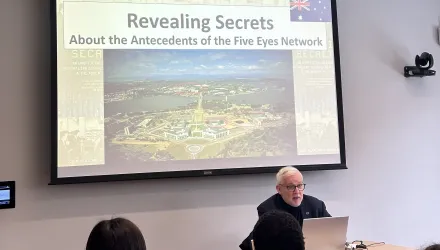Memo in report Confrontation or Collaboration? Congress and the Intelligence Community
This originally apeared as an Issue Memo (pp. 88-91) in the report Confrontation or Collaboration? Congress and the Intelligence Community, a publication of The Intelligence and Policy Project of Harvard Kennedy School's Belfer Center for Science and International Affairs.
Over the past several years, significant debate has emerged regarding the role that the private sector plays in national security operations. Since 9/11, the Intelligence Community has relied heavily on private contractors for many different types of support. Given the historic and growing ties between the Intelligence Community and private corporations, the 111th Congress will likely need to assess the overall value of this relationship.
This memo provides members of Congress and their staffs with an overview of the role of private corporations working with and within the U.S. Intelligence Community (IC).
The Intelligence Community and the Private Sector
The IC maintains relationships with private corporations to help meet national security goals. Reasons for this partnership include:
Technical Strengths
Private firms with specialized technical capabilities can be used to address to national security issues. Historically, government agencies such as the Central Intelligence Agency (CIA) and the Department of Defense (DoD) have worked with for-profit firms on various technical projects, such as:
- The U-2 spy plane—first used to conduct flights over the Soviet Union and still in operation today—was built through the CIA's collaboration with a private aeronautics firm.
- The MQ-1 Predator Unmanned Aerial Vehicle (UAV) was designed and built by a private firm for the U.S. Air Force.
Manpower and Managerial Expertise
Employees of private firms often have cultural, military, or linguistic backgrounds that are useful to the U.S. Government.
- Protection: Private firms guard buildings, personnel and U.S. infrastructure in diplomatic and military facilities throughout the world. For example, a private firm protects the U.S. Ambassador to Iraq and other key diplomats within the country.
- Translation: Contractors often serve as interpreters in U.S. detention facilities abroad.
- IT Skills: Private firms help with interagency coordination by providing collaboration tools across agencies, and they provide security tools for government computer systems.
- Consultation: Private companies provide strategy consulting services on various topics to the IC.
Workplace Flexibility
Government managers often employ contractors to quickly fill billets that otherwise might not suit permanent government positions. Contractors usually can also be removed from their positions with greater ease than government employees.
- After 9/11, the IC hired contractors to fill immediate staffing needs due to a shortage of available intelligence professionals; the former White House Coordinator for Security and Counterterrorism, however, suggests that the current contractor staffing levels stem from a lack of a long-term strategic plan by the IC for hiring and retaining personnel.
- Private firms supply manpower to fulfill the IC's mundane but critical functions, such as entering data into databases and other administrative obligations.
Contracting Controversies
The growing corporate presence within the IC has been controversial, as some would argue that contractors increasingly outnumber government employees in IC workspaces. The primary concern relating to this growth is that private contract employees may have started to complete tasks that were previous inherently governmental functions, such as intelligence collection or analysis. Some critics note that contractors maintain a fiduciary duty to their employer, not to the United States government.
Number of Contractors
- According to some press reports, 51% of Defense Intelligence Agency's (DIA) staff currently are contractors.
- As of 2007, the DIA was preparing to pay private firms up to $1 billion to conduct "core intelligence tasks of analysis and collection" over the next several years, according to a press report.
Funding of Contractors
- A presentation prepared in May 2007 by an Office of the Director of National Intelligence (ODNI) Senior Procurement Executive suggested that contracts with private firms make up approximately 70% of the IC's budget. The DNI later refuted these figures, stating that they were based on a "small, anecdotal sample of a portion of Intelligence Community contracting services."
- A Senate intelligence report conducted in May 2007 found that a contractor generally costs twice as much as a government employee; a federal worker costs approximately $126,500 while a contractor annually costs $250,000.
Governability of Contractors
- Laws and regulations that define contractor behavior in conflict zones remain vague.
- Many private employees fulfill military functions that distinguish them from civilians, yet they are not legally soldiers.
- A 2004 Army investigation into detainee mistreatment in Iraq noted, "No doctrine exists to guide interrogators and their intelligence leaders... in the contract management or command and control of contractors in a wartime environment."
- When contractors engage in questionable behavior overseas, it remains unclear who is responsible for investigating, prosecuting, and punishing them.
The Future of Contracting?
The IC will rely heavily on private firms for intelligence functions in the future. Policymakers should therefore continue to refine the appropriate balance between internally and externally sourced tasks and responsibilities. Lawmakers should consider:
- What are the most effective means of accountability and transparency for contractors? How can Congress most effectively provide mechanisms for oversight, management, and evaluation of outsourced intelligence functions?
- What type of guidelines determine when is it appropriate for private firms to engage in sensitive intelligence functions, such as collecting intelligence, conducting covert action, and drafting finished analysis?
- When should private firms participate in necessary wartime functions, such as detaining and interrogating detainees?
Sources
"CIA, NRO, and Air Force Celebrate the U-2: A Revolution in Intelligence." Central Intelligence Agency, 28 September 1998. https://www.cia.gov/news-information/press-releases-statements/press-release-archive-1998/pr092898.html.
Clarke, Richard. Your Government Failed You. New York: Harper Collins, 2008.
Fainaru, Steve. "Where Military Rules Don't Apply." Washington Post, 20 September 2007. A01.
Hillhouse R.J. "Outsourcing Intelligence." The Nation. 24 July 2007.
Holmes, Erik. "Bringing UAVs to Life." Air Force Times. 7 November 2008.
Pincus, Walter. "Defense Agency Proposes Outsourcing More Spying." Washington Post, 19 August 2007. A03.
Scahill, Jeremy. Blackwater: the Rise of the World's Most Powerful Mercenary Army." New York: Nation Books, 2007.
Shorrock, Tim. "Former High-ranking Bush Officials Enjoy War Profits." Salon Magazine. 29 May 2008.
Statement by Ellen Cioccio, Acting Director of Public Affairs, ODNI 19 June 2007. http://www.dni.gov/announcements/20070619_announcement.pdf.
Senate Select Committee on Intelligence Report 110-75, May 31, 2007.
U.S. Army Report, "The Investigation of Intelligence Activities at Abu Ghraib," p. 18. http://www4.army.mil/ocpa/reports/ar15-6/index.html.
Rosenbach, Eric and Aki Peritz. "The Role of Private Corporations in the Intelligence Community." Memorandum, "Confrontation or Collaboration? Congress and the Intelligence Community," Belfer Center for Science and International Affairs, Harvard Kennedy School, July 2009.







